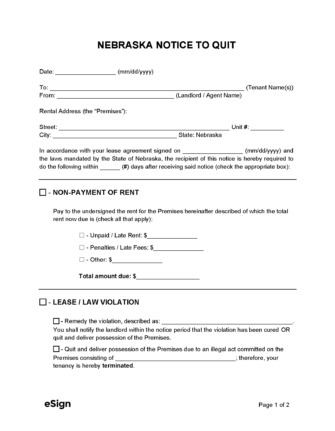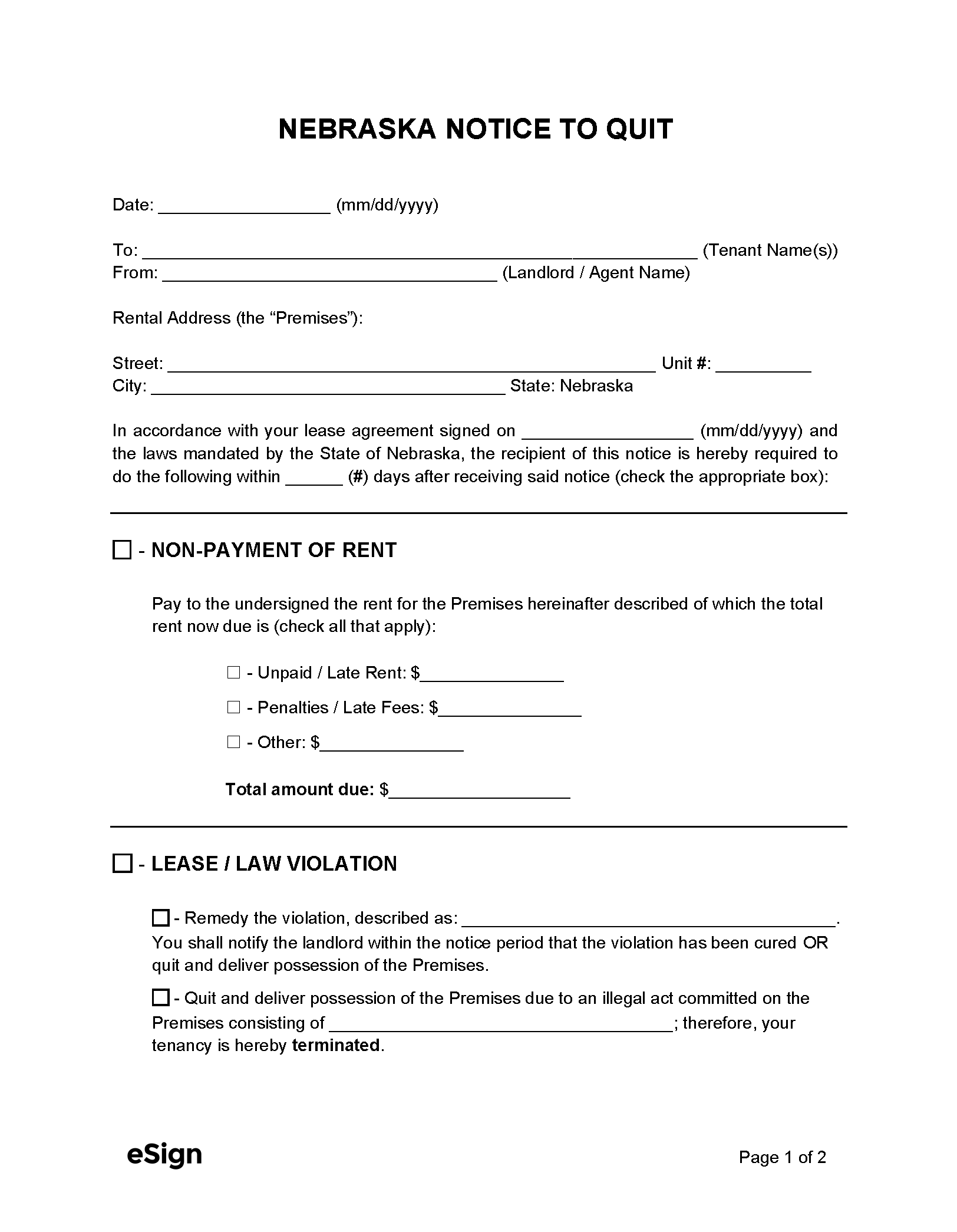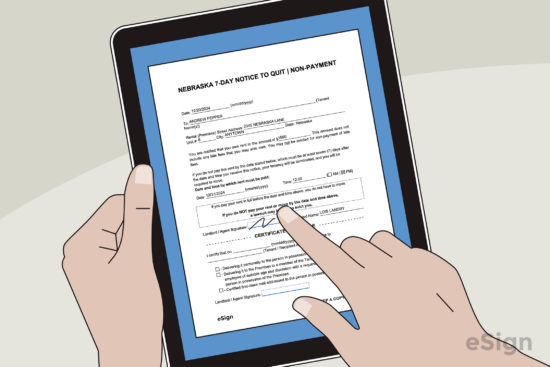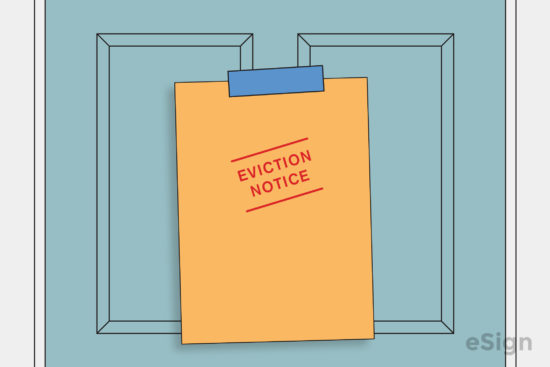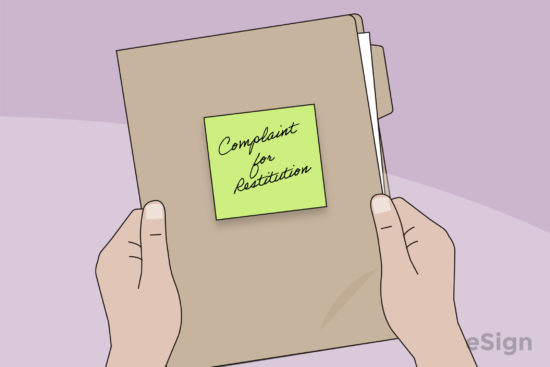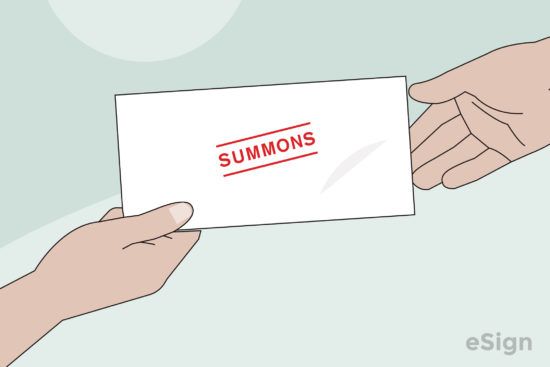A Nebraska eviction notice is used to inform a tenant that they are required to vacate the premises, pay rent, or cure a lease violation. Each notice states the duration in which the tenant must comply with the landlord’s demands. In the cases of non-payment and non-compliance with the lease, tenants will be given the opportunity to correct their issues to avoid lease termination. Should the tenant fail to comply with the landlord’s terms before the notice period expires, their tenancy will terminate and the landlord may seek an eviction in court by filing a forcible entry and detainer lawsuit.
By Type (4)
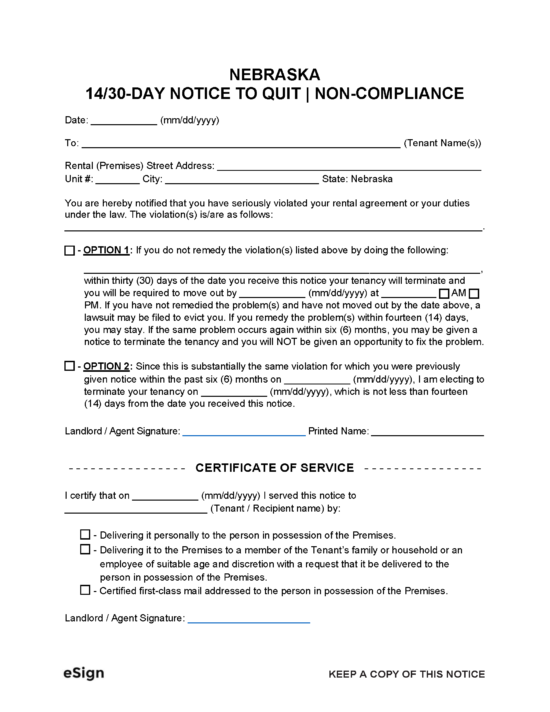 7-Day Notice to Quit for Non-Payment – This notice is served on tenants who fail to pay rent on time. The tenant will have seven (7) days to pay their rent or vacate the premises.
7-Day Notice to Quit for Non-Payment – This notice is served on tenants who fail to pay rent on time. The tenant will have seven (7) days to pay their rent or vacate the premises.
Download: PDF, Word (.docx), OpenDocument
 14/30-Day Notice to Quit for Non-Compliance – Informs a tenant that they are in violation of their lease terms or statutory rental laws. This notice may also be used when a tenant commits the same violation within six (6) months of an initial infraction.
14/30-Day Notice to Quit for Non-Compliance – Informs a tenant that they are in violation of their lease terms or statutory rental laws. This notice may also be used when a tenant commits the same violation within six (6) months of an initial infraction.
Download: PDF, Word (.docx), OpenDocument
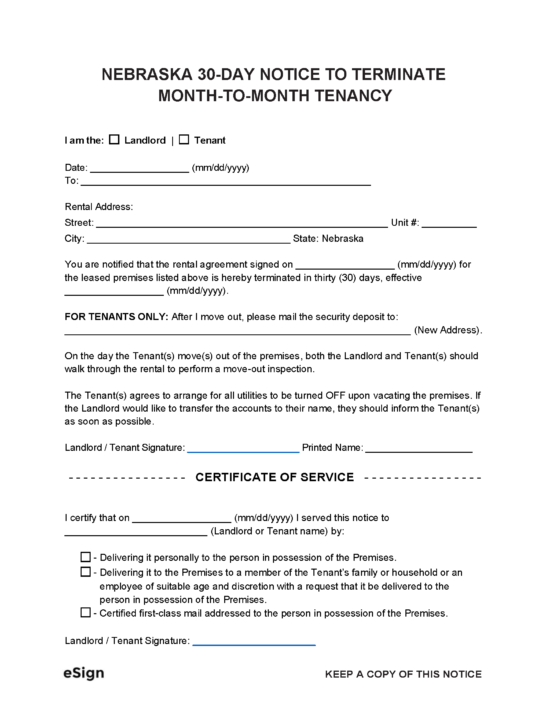
Download: PDF, Word (.docx), OpenDocument
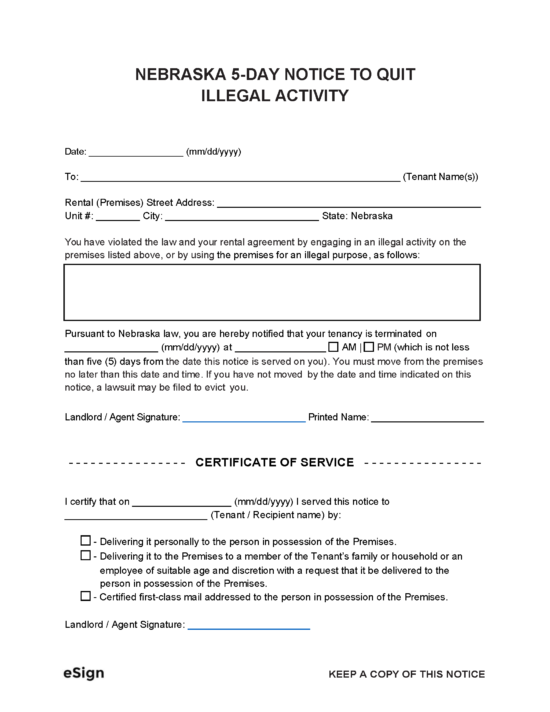
Download: PDF, Word (.docx), OpenDocument
Contents |
Eviction Laws + Required Notices
- Grace Period (§ 76-1414(3)): None
- Non-Payment of Rent (§ 76-1431(2)): Seven (7) Days
- Lease Non-Compliance (§ 76-1431(1)): Fourteen (14) or Thirty (30) Days
- Illegal Activity (§ 76-1431(4)): Five (5) Days
- Periodic Tenancy Termination (§ 76-1437(2)): Thirty (30) Days
How to Evict a Tenant
Landlords can evict a tenant in Nebraska by filing a forcible entry and detainer lawsuit with a county or district court. However, before initiating the eviction process, landlords must provide their tenants with a written notice that indicates the reason for terminating the tenancy and the amount of time the tenant has to vacate.
Step 1 – Complete Eviction Notice
There are several eviction notices available in Nebraska. From the following list, the landlord must select the appropriate notice and fill it in electronically or by hand:
- 7-Day Notice to Pay or Quit
- 14/30-Day Notice to Comply or Quit
- 30-Day Notice to Terminate a Month-to-Month Lease
- 5-Day Notice to Quit for Illegal Activity
Step 2 – Deliver Notice to Tenant
After the notice has been filled out and signed, it must be delivered to the tenant by the landlord. The notice can be hand-delivered or simply posted conspicuously on the premises.
Step 3 – Wait for Notice Period to Expire
The tenant will have a set number of days to comply with the terms of the notice. The notice period will range from five (5) to thirty (30) days depending on the reason for the eviction. During this time, the tenant must either vacate the premises or cure their lease violations (if applicable). Only after the notice period expires may the landlord proceed to file an eviction lawsuit.
Step 4 – File Complaint for Restitution
If the tenant doesn’t comply with the notice terms within the given time frame, the landlord must file a Complaint for Restitution with a district or county court (document may be obtained from a clerk). A fee will be required at this time, the amount of which will vary depending on the court where the document is filed. Once the complaint is processed, the landlord will be issued a Summons form which serves as a notice of the upcoming eviction lawsuit.
Step 5 – Serve Summons on Tenant
The Summons form must then be served on the tenant to notify them of the eviction lawsuit. There are several methods of service that are accepted in Nebraska. The landlord may serve the tenant using any of the following methods:
- Personal service by the landlord to the tenant;
- Personal service by the landlord to a resident of suitable age at the tenant’s usual place of residence;
- Certified mail (return receipt requested) within ten (10) days of issuance of the Summons, and proof of service filed with the court with the signed receipt attached; or
- Designated delivery service within ten (10) days of issuance of the Summons, with a signed proof of service attached and filed with the court.
If the above-stated service methods prove unsuccessful despite the landlord’s efforts for delivery, the landlord may instead leave a copy of the document at the tenant’s last-known address and mail a second copy to the same address by first-class mail. The landlord must also file an affidavit with the court proving their attempts at delivery and stating the reason that such attempts were unsuccessful.
Step 6 – Attend Eviction Trial
Both the landlord and tenant must appear in court for the eviction trial. The landlord should be sure to bring copies of their eviction documents and any evidence supporting their case. If the court rules in favor of the landlord, the tenant will be forced to vacate within a specific number of days.
Step 7 – Serve Writ of Restitution on Tenant
Following the landlord’s victory in court, a writ of restitution may be requested which will authorize the sheriff’s department to remove the tenant from the property within ten (10) days. To obtain a writ of restitution, the landlord must file a Praecipe for Writ of Restitution/Execution with the court. The writ of restitution will be served on the tenant by the sheriff’s department (a service fee will be required).
Step 8 – Reclaim Possession of the Premises
The sheriff’s department will visit the tenant on the date stated in the writ of restitution. The tenant will then be forced to vacate the property thus returning possession of the dwelling back to the landlord.
Court Forms + Resources
Forms
- Complaint for Restitution – Obtained at the district or county court where the property is located.
- Signing: N/A
- Summons – Issued to the landlord after filing a Complaint for Restitution with the court.
- Signing: N/A
- Praecipe for Writ of Restitution/Execution (CC 3:24)
- Signing: Landlord
- Writ of Restitution – Requested by the landlord from the court after winning an eviction lawsuit.
- Signing: N/A
